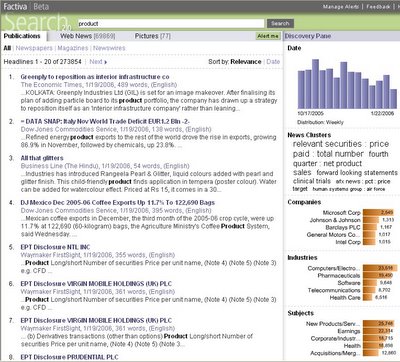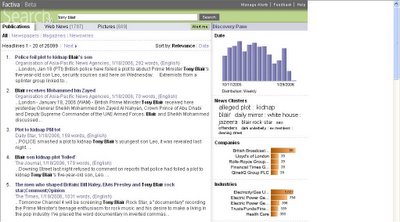Every industry creates its own jargon, but the tech industry is renown for coining phrases and over-using terms to the point of abuse.
Take the word “solution” for example. Anecdotally, I would have thought that usage of that word overtook the term “product” ages ago. All you hear about these days are SOLUTIONS!

I typed both terms into the whizzy new
Factiva Search 2.0 to see how frequently both terms were being used, and which companies and industries were most frequently associated with those terms.
Surprisingly, there were more mentions of the term “product”, with 273854 articles in the last ninety days referencing this term, compared with the 109470 articles that mentioned “solution”.
Not surprisingly, the industries most associated with the term “product” were Computers/Electronics, Pharmaceuticals, Software, Telecommunications and Health Care. It was interesting to note that the largest mentions of the term came from Business Wire and PR Newswire, presumably via press releases or other PR-generated material.
Microsoft, Johnson & Johnson, Barclays, General Motors and Intel had the most product-related news in the last ninety days.
When it came to “solution”, the IT giants predictably ranked highest in their use of their word. Microsoft, IBM, Cisco, HP and Intel were all associated heavily with the term “solution”, although Microsoft’s association with it was nearly more than double that of IBM’s in the last ninety days. As the largest software company in the world, that’s not surprising.
What is interesting however, is to see where and how that term is picked up in different media. Factiva Search 2.0 instantly lets me click down to a subset of the total results into different media types including Newspapers, Magazines and NewsWires. In the case of Microsoft, which resulted in a total of 1024 news items being associated with the term “solution”, 125 of those items were reported in Newspapers and 157 in magazines, compared with the 590 mentioned in Newswires.
These ratios would no doubt be similar for other tech companies. Perhaps a conclusion we can draw, is that many PR practitioners (and yes, I can put my hand up as being guilty of this too), are using terminology in press releases that is simply not being picked up in the media. Would we ever dare not to use the term “solution” in a press release?
Fortunately, Factiva Search 2.0 can immediately highlight how and where messaging is being picked up, what terms are hot (and over-used) and which companies are most frequently associated with them. The challenge for PR practitioners is to find the balance between using what has become almost-mandatory jargon and producing clear, effective communications to the target audience.















